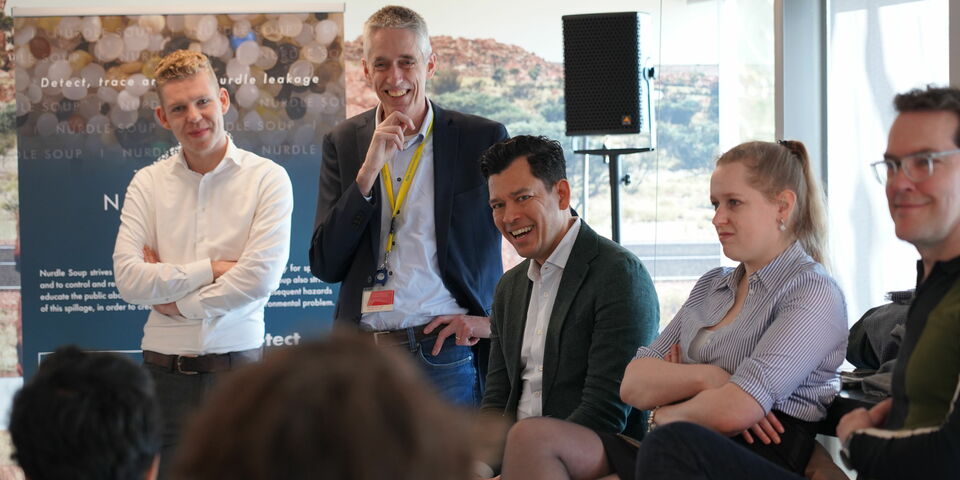D66 MP meets with student teams
The TU/e campus is the site of a vigorous campaign for next week’s municipal elections. Today, it was D66 MP Raoul Boucke’s turn to come to campus and meet with, among others, student teams to talk to them about sustainability. He didn’t just urge them to vote, but above all to become politically active. “We desperately need technological knowledge in politics.”
As TU/e student Boris Zwaan gives his fellow party member a tour of the campus grounds, three student teams prepare themselves for the pitch they are about to make to MP Raoul Boucke. The teams InMotion, Solid and Nurdle Soup get to present their projects in the event area at innovation Space. This is their chance to gain recognition in national politics. In turn, Boucke gets the opportunity to bring his liberal-democratic party D66 to the attention of the students, in light of Wednesday’s elections.
However, the subject of the municipal elections is hardly touched upon during the meeting. The students pitch their projects, Boucke asks questions: Is the nurdle soup a growing problem? No, the students say, but it is a problem that has been around for decades and that needs to be solved. The politician agrees. Lynn van Mourik of InMotion explains how the students set aside their studies for an entire year so that they can focus all their attention on their student team. The members of Solid show Boucke how to use iron powder to generate electricity.
Engineers
Boucke, who studied at TU Delft, says that the students have inspired him. “I’m spokesperson for Climate and Energy, which is why I’m deeply committed to finding innovative solutions. That’s what people here are working on. We need those solutions now, and that’s why we need to accelerate the process from research phase to implementation. Student play a vital role in this process.” He also hopes that his visit will bring politics closer to students. “Students of engineering programs in particular. We benefit a great deal from the research they carry out, but we could also really use them in the world of politics.”
Boucke reiterates his plea for technological knowledge in politics during an open discussion with students. He brings up the current debate surrounding the government’s ambition to ban natural gas by 2050. It’s good to have people sitting at the table who have knowledge about the technological options our country has, such as hybrid water pumps, he explains. “You need to know what this pump does exactly, and that it is an interim solution.” That is why, more than anything else, he urges the students to become politically active. The students realize that they have an important advisory role, but so far no one seems to aspire to a career in politics.
But becoming politically active doesn’t mean that you should run for a seat in the House of Representatives or the Municipal Council, Boucke says. “There are social organizations such as Urgenda. They employ a large number of engineers.” What matters, Boucke believes, is that students focus their attention on social issues.
Largest party
No one needs to persuade Boris Zwaan to become politically active.The former University Council member organized Boucke’s visit to TU/e and is positioned 22nd on the list of D66 in Eindhoven. “I’m the last candidate on the list and I merely want to support the party, I don’t know if I will continue to live in Eindhoven,” Zwaan says. He is satisfied with Boucke’s visit, which turned out to be of interest to both sides. “Raoul didn’t come here to send a message; politicians should listen and that’s what he did. He could see with his own eyes what we do here in Eindhoven in the field of challenge-based learning. It’s important that politicians in The Hague learn about this as well, because this is something that should be applied nationwide.”
The election polls look good for D66, Zwaan says. “There’s a chance that we could become the largest party in Eindhoven. That means that we get to appoint the informer and start the negotiations. From that position, the party can play a more prominent role in the city’s efforts to become more sustainable.” That’s why his call to students doesn’t come as a surprise: “Go out and vote!”



Discussion